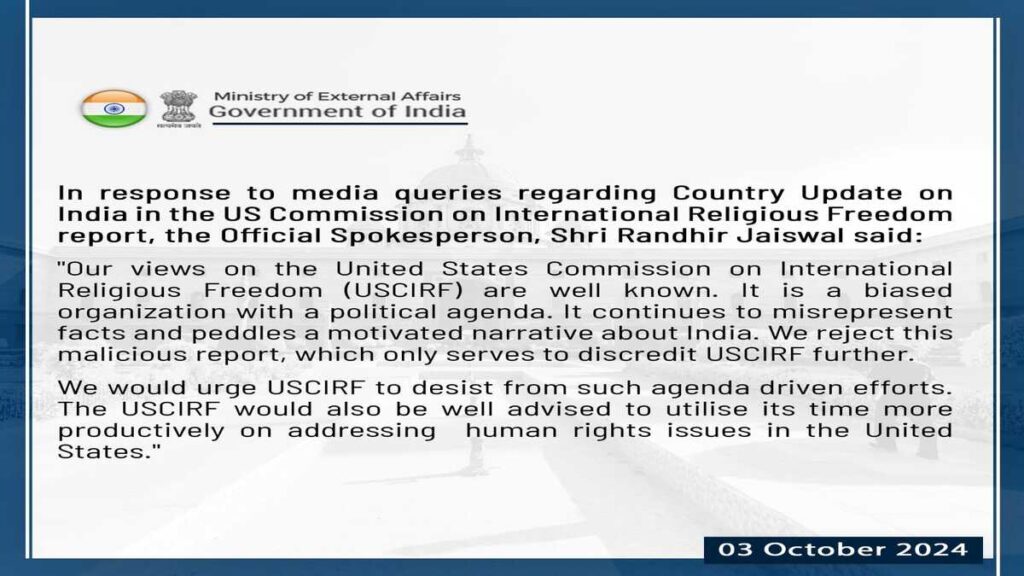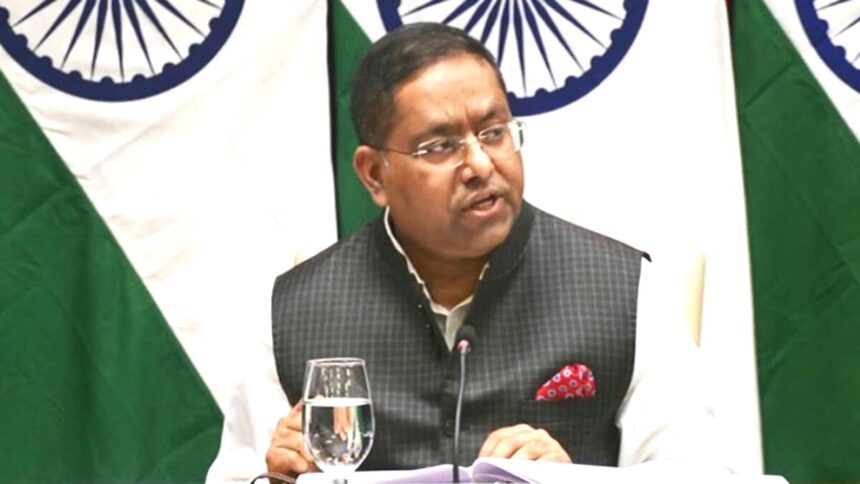In a recent clash of narratives, the Indian government has firmly rejected a report by the U.S. Commission on International Religious Freedom (USCIRF) that raised concerns about the state of religious freedom in India. The Ministry of External Affairs (MEA) characterized the report as biased and driven by a political agenda, emphasizing that it misrepresents the reality on the ground.
Context of the USCIRF Report
The USCIRF’s annual report has gained attention for recommending that India be classified as a “Country of Particular Concern.” The commission highlighted an alarming trend of what it termed “increasing abuses” against religious minorities in India. It specifically noted incidents of violence, property destruction, and legal frameworks that it argues disenfranchise certain religious groups.

Specific Allegations
According to the USCIRF Report, the situation in India has deteriorated significantly over the past year. The report pointed out multiple instances of violence, including killings, beatings, and lynchings carried out by vigilante groups. It also mentioned the arbitrary arrests of religious leaders and the demolition of homes and places of worship as evidence of severe violations of religious freedom.
The commission’s report underscores concerns surrounding the Citizenship Amendment Act (CAA) and various state-level anti-conversion laws, suggesting that these legal measures have been used to marginalize religious minorities further.

India’s Strong Rebuttal
In response to these allegations, MEA spokesperson Randhir Jaiswal condemned the USCIRF report as “malicious.” He maintained that the allegations made by the commission are untrustworthy and are a part of a bigger, deliberate narrative meant to damage India’s reputation internationally.
“Our views on the USCIRF are well known. At a press conference, Jaiswal declared, “It’s a political agenda-driven organization that is biased.” He urged the USCIRF to focus on human rights issues within the United States instead of interfering in India’s internal matters.
A Call for Constructive Dialogue
Jaiswal’s remarks reflect a broader sentiment within the Indian government regarding external criticism of its domestic policies. By advising the USCIRF to “desist from such agenda-driven efforts,” he suggested that the organization should redirect its attention to addressing human rights concerns in its own backyard. This statement not only emphasizes India’s stance but also serves as a reminder of the complexities involved in international discourse on human rights.
Historical Context
India’s relationship with the USCIRF Report has been fraught with tension for years. Since the tenure of former Prime Minister Manmohan Singh, India has consistently denied visas to USCIRF members, citing interference in its domestic affairs. This long-standing refusal underscores a growing unease in New Delhi regarding foreign scrutiny of its internal policies, particularly those concerning religious freedom and minority rights.
Accusations of Bias
India has frequently charged that reports from the USCIRF are agenda-driven and lack scientific rigor. Critics argue that the commission’s findings often reflect a limited understanding of India’s diverse social fabric, which encompasses a myriad of religious, cultural, and political dynamics. The MEA’s recent statement reiterates this perspective, casting doubt on the legitimacy of the USCIRF’s claims.
The Broader Implications
Beyond the immediate matter of religious freedom, there are ramifications to the conflict between India and the USCIRF. It highlights a significant divide between Western perspectives on human rights and India’s approach to governance and social cohesion. The contrasting narratives about religious freedom could affect diplomatic relations and international perceptions of India, especially as the country positions itself as a global leader in various domains.
A Call for Nuanced Understanding
For a comprehensive understanding of the situation, it is crucial to consider the complexities involved. India is home to over a billion people with diverse religious beliefs, and its socio-political landscape is shaped by a myriad of factors. Simplifying these issues into binary narratives often leads to misinterpretations and misunderstandings, which can further fuel tensions.
As India continues to grapple with internal challenges related to religious freedom and minority rights, the clash with the USCIRF serves as a reminder of the delicate balance between national sovereignty and international scrutiny. While the USCIRF aims to highlight potential abuses, the Indian government’s strong rebuttal illustrates its commitment to defending its policies and narratives against external criticism.
Moving forward, a constructive dialogue that takes into account the complexities of India’s social fabric may be essential for fostering mutual understanding and cooperation in addressing human rights issues on a global scale.
Read More: 3 lives are lost in a tragic helicopter crash in Pune






